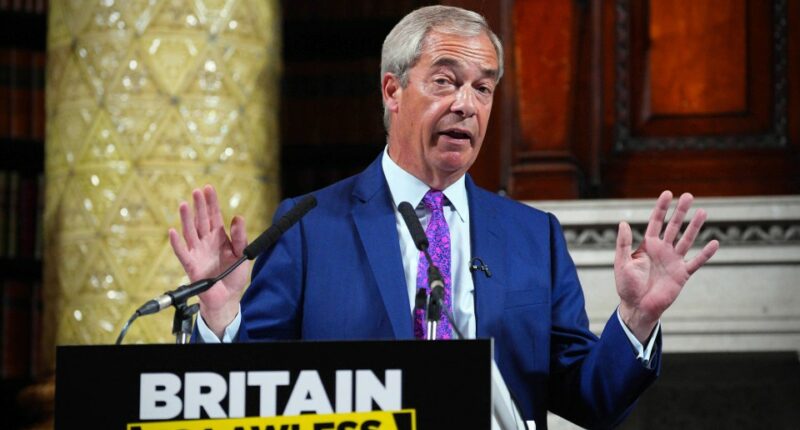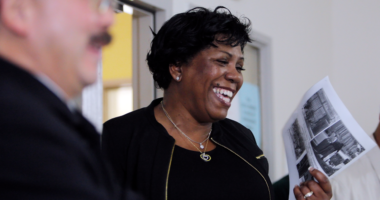Share this @internewscast.com
For the first time ever, Britain could see a five-party “Rainbow Coalition” if there’s a slight change in poll numbers, experts have suggested.
Recently, pollsters from More in Common conducted an extensive survey forecasting voting patterns for the next election, analyzing each seat individually. Their findings suggest a coalition government might come into power by 2029.
The survey indicates that Nigel Farage’s Reform UK would emerge as the largest party, claiming 290 seats, but still fall short of a majority. They would likely need to partner with the Tories to form a government at No 10.
But just a 3.5 per cent swing from Reform to Labour and a small bump for the Greens would see a five-party Rainbow Coalition led by Labour — with the Lib Dems, SNP, Greens and Plaid Cymru.
By Luke Tryl – pollster at More in Common
DAYS before the 2015 General Election, then-Prime Minister David Cameron said: “Britain faces a simple and inescapable choice — stability and strong Government with me, or chaos with Labour’s Ed Miliband.”
And in the decade since, with six Prime Ministers, four elections, Brexit gridlock, a pandemic, a cost of living crisis, partygate and the mini-Budget, many rightly wonder: “If that was stability, how bad could chaos have been?”
But at the time Cameron’s pitch worked, partly because many feared Labour might end up governing in a three-party combo with the Lib Dems and SNP, with the late former Scottish First Minister Alex Salmond calling the shots.
Unlike our neighbours on the Continent, we aren’t used to coalitions and dislike the idea of smaller parties holding the Government to ransom.
Fast forward to 2025 and it looks like Brits might have to get used to coalitions. Our political map has been reshaped.
Fewer than half the public now describe themselves as strong supporters of any one party.
The days of being “a Labour family” or voting for “anything with a blue rosette” are over. Voters shop around to see what they like best.
As recently as 2017, the two main parties took more than 80 per cent of the vote.
That plummeted to 57 per cent in last year’s election and our polling suggests it’s fallen further still since — just 43 per cent now say they’d vote Labour or Tory.
Instead, voters are turning to new emerging parties on the Right and the Left.
Last year’s General Election was the first time post-war that more than three parties each won over ten per cent of the vote — and more than four won over five per cent.
Why is this happening? More in Common’s latest report, Shattered Britain, delves into what’s behind our growing fragmentation.
Simply put — it finds the old dividing lines of left and right no longer cut it. New political fault lines are emerging.
These include whether we can fix a country many feel is broken by improving our institutions or, as 38 per cent think, we need to “burn them all down”; whether the answers to our problems are common sense or complex; whether diversity strengthens or erodes British identity; and crucially whether we trust mainstream news or prefer independent voices online.
Just as our politics is fragmenting, so too is where we get our information with a knock-on effect on politics, reducing the stranglehold the big two parties have in communicating with the public.
An election tomorrow could deliver a political map we’ve not seen before.
Luke Tryl
None of these divide the map neatly on to our existing political landscape and our First Past The Post system is struggling to cope as these new fault lines scatter Britons’ votes across multiple parties.
More in Common’s latest MRP — a model for projecting what the next Parliament might look like — helps to show how this might all play out.
And it suggests an election tomorrow could deliver a political map we’ve not seen before.
Reform UK would come first on 290 seats, with Labour trailing on 126, the Tories barely third on 81 and the Lib Dems at their heels on 73.
NUMBER OF SEATS IF ELECTION TOMORROW
BRITAIN is heading for a five-party “Rainbow Coalition” for the first time in its history if there is a small shift in the polls, experts have warned.
Pollsters More in Common recently carried out a massive survey predicting how people may vote at the next election, seat by seat. It predicted a coalition government is on the cards in 2029.
Nigel Farage’s Reform UK would be the biggest party on 290 seats — but not enough for a majority. They would have to team up with the Tories to get into No 10.
But just a 3.5 per cent swing from Reform to Labour and a small bump for the Greens would see a five-party Rainbow Coalition led by Labour — with the Lib Dems, SNP, Greens and Plaid Cymru.
With 325 seats needed for a majority, the likeliest outcome would be a Reform UK–Tory coalition. But how comfortable would the Conservatives be as junior partners to Farage’s party, given the bad blood?
Even those headline numbers hide more turbulence beneath the surface.
Nearly 100 seats could be won on under 30 per cent of the vote and small shifts could flip many of them.
Sixteen and 17-year-olds, voting for the first time at the next election, will make up two to three per cent of the vote, but in tight races that could make all the difference.
With only a modest Labour recovery from mid-term blues and a Reform dip, we could end up with the only viable option being a five-party coalition: Labour, Lib Dems, SNP, Greens and Plaid Cymru. How’s that for a stable Government?
Ungovernable
And that’s before factoring in Jeremy Corbyn’s newly announced party, which our polling suggests could take ten per cent of the vote, further muddying our electoral waters.
At this stage, it’s fair to ask will the next Parliament be ungovernable?
Maybe, but we’ve been here before. In 2019, the Brexit Party was topping the polls, the Lib Dems surged, and the two main parties were barely registering a third of the vote.
On election day, Boris Johnson won a stonking majority. In the 1980s, the SDP–Liberal Alliance looked set to reshape politics, only to fall back.
Still, as Britain drifts into uncharted political waters and the two main parties continue to struggle, it might be wise to use our summer holidays on the Continent to pick up a few tips on coalition-building from our European neighbours.
Voting map blown apart

By Kate Ferguson
THE UK used to be known for its stable, two-party system.
The choice was either Tory or Labour. Elections nearly always delivered a majority government.
But all that could be about to change. Our political system has become fragmented.
Nigel Farage and Reform UK have redrawn the political map and decimated the Tory vote.
Labour are being challenged on the Left by the rise of the Greens and the creation of Jeremy Corbyn’s far-left party. That begs the question: is Britain about to become ungovernable?
We are not used to coalitions but pollsters say the most likely outcome will be a Reform-Tory pairing. But can we imagine Nigel Farage and Kemi Badenoch in bed together?
The alternative is a coalition of Labour, the Lib Dems, SNP, the Greens and Plaid Cymru.
The next general election is still four years away and much can happen in that time.
One thing is clear — voters want politicians who can get things done. It’s why they gave Boris Johnson a majority to get Brexit sorted.
It’s why they handed Sir Keir Starmer a landslide — then sent his ratings tumbling when he failed to come up with reforms.
If the polls stay the same then Britain is heading for more political turbulence. But who knows? Voters may hand Nigel Farage a majority next time.
I would not bet against it.





















